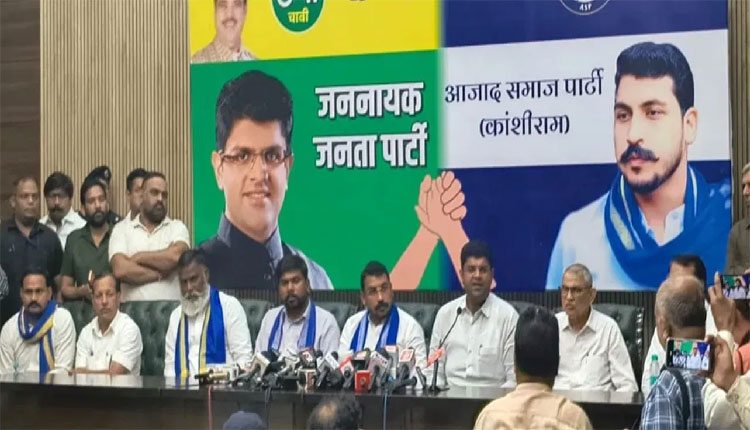Chandigarh, Haryana: As the Haryana Assembly elections draw closer, the political scene is largely viewed as a contest between the Congress and the Bharatiya Janata Party (BJP). However, smaller parties like the Indian National Lok Dal (INLD) and the Jannayak Janta Party (JJP) are working to position themselves as potential kingmakers. Both parties have aligned themselves with Dalit-based parties in an effort to broaden their electoral appeal.
The INLD has formed an alliance with Mayawati’s Bahujan Samaj Party (BSP), while the JJP has partnered with Chandra Shekhar Azad’s Azad Samaj Party (ASP). Despite these alliances, both the INLD-BSP and the JJP-ASP have yet to announce their full list of candidates, sparking speculation that they may be waiting for potential candidates who have rebelled against the Congress and BJP.
Delays in Candidate Announcements Raise Questions
Under the seat-sharing arrangement, the INLD will contest 53 seats and the BSP 37. Similarly, the JJP plans to field candidates in 70 seats, with the ASP contesting 20. However, both alliances have only announced candidates for a limited number of seats. With just two days left for nominations, the question arises whether these parties are struggling to find suitable candidates or are simply waiting for disgruntled leaders from the BJP and Congress.
So far, the JJP-ASP alliance has announced candidates for 31 of the 90 seats in Haryana, with two lists released – the first naming 19 candidates (15 from JJP and 4 from ASP) and the second listing 12 (10 from JJP and 2 from ASP). Meanwhile, the INLD-BSP alliance has only revealed candidates for 14 seats, leaving the names for 76 seats still to be announced.
Strategic Waiting Game
Political observers note that both alliances appear to be playing a strategic waiting game, carefully selecting their candidates in hopes of strengthening their positions. They are reportedly keeping an eye on potential rebel leaders from the BJP and Congress, many of whom are unhappy with their party’s choices.
Aditya Chautala, a BJP member who did not receive a ticket for the assembly elections, has already switched to the INLD and has been fielded as their candidate from the Dabwali assembly seat. Similarly, the Aam Aadmi Party (AAP) has also given tickets to several rebel leaders from both the Congress and the BJP. These moves suggest that smaller parties see an opportunity to capitalise on dissent within the two major parties.
The Stakes for Smaller Parties
The stakes are high for smaller parties like the INLD, BSP, and JJP. With only one sitting MLA, Abhay Singh Chautala, and JJP holding ten seats from the 2019 elections, these parties are looking to increase their influence. Attracting rebel leaders could significantly boost their chances of winning additional seats.
While the Congress and BJP have announced their candidates for several seats, internal dissent and rebellion loom large, particularly within the Congress, which has declared candidates for 41 of the 90 seats, including 28 sitting MLAs. Concerns about further rebellion have reportedly caused the party to tread cautiously in its selection of candidates.
The Hunt for Strong Candidates Continues
With only a few days left for filing nominations, the INLD-BSP and JJP-ASP alliances are focused on securing candidates with strong electoral appeal. They are particularly interested in former ministers or MLAs who have switched allegiances or are considering a change. This strategy could enable them to consolidate their positions in several constituencies and emerge as significant players in Haryana’s political landscape.



Comments are closed.